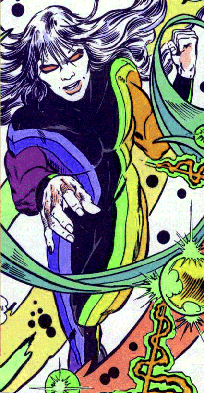Chroma (comics)
Chroma is a fictional character that first appeared in Infinity, Inc. #14 (1985) as an unknown cosmic entity.[1]
| Chroma | |
|---|---|
 Chroma from Infinity Inc. #14 with art by Todd McFarlane | |
| Publication information | |
| Publisher | DC Comics |
| First appearance | Infinity Inc. #14 (1985) |
| Created by | Todd McFarlane, Roy Thomas |
| In-story information | |
| Abilities | God-like |
Fictional character biography
Chroma interrupts a televised concert with a song about apocalyptic events. The song, though talking about death, somehow proves so engaging, many people desire to hear it again and again.
Not everyone is affected in the same way. Obsidian, one of the 'Infinitors', having just come off a bad date, finds himself uninvolved with the song. Wishing to confront Chroma, he finds himself battling his own friends. He manages to stop Chroma but is, in turn, stopped personally by his very own super-powered sister Jade.
It turns out Chroma is one of many duplicates of the same entity who tests out their apocalypse songs on many worlds. Obsidian manages to defeat him in their first confrontation, though Chroma claims it was because his attentions were diverted to another event happening on the far side of the galaxy.
Chroma further states that if Obsidian had managed to attack him a second time, Chroma would have let this earth-form die, thus preventing humanity from ever forgetting his song.
Chroma decides to leave and claims it will be for a million years, after which he will return with a new song. However, it now seems that he never left Earth at all and instead remained in hiding for some reason.
In Justice Society of America (vol. 3) #10, Chroma is slain by Gog, a being responsible for the death of former Teen Titan villain Goth. Gog's desire is to kill all self-proclaimed false gods to make way for himself. In the following issue, his death is investigated by the F.B.I.. An agent who touches the body has his hair go white and he becomes deaf and blind. Whether this is an indication that Chroma still lives or not remains to be seen.
References
- Thomas, Roy (2009). All-Star Companion vol 4. TwoMorrows Publishing. pp. 175–176. ISBN 9781605490045.